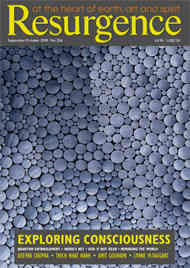Timelines can be a powerful tool to help us reflect on where we have been, appreciate where we are now and imagine where it is we need to go next. In this stimulating new book, Shaun Chamberlin takes us on a timeline trajectory towards the big uncertainties that we know we must embrace, so revealing an unfamiliar and uncertain future landscape.
Many of us still haven’t really grasped the serious nature of our predicament. On numerous fronts, the consequences of the past 150 years of our fossil-fuel frenzy are simultaneously coming home to roost. Even senior experts, scientists, NGOs and political leaders fail to appreciate that the most recent evidence on the looming climate crunch and energy crunch reveals a situation more urgent than had been expected, even by those who have been following it closely for decades. In assessing the scale of these challenges, I found it genuinely refreshing to discover a book that had broken out of the pervasive ‘silo’ mentality that so often isolates those writing on climate change, peak oil and international relations. Shaun’s grip of both climate science and politics is exemplary, and well interpreted for the new or non-technical reader.
The Transition Timeline builds on the momentum the Transition movement has achieved in bridging the widening gulf between our current trajectory and the rapid transition away from fossil-fuel dependence that our most recent science tells us is urgently required. Shaun makes a powerful case that optimism is the approach that offers us the greatest survival advantage – but for it to be effective there must be no rosy-tinted illusions. Shaun achieves this admirably; his optimism is tempered by a sense of realism, and thoroughly grounded in a genuine appreciation of the scale of the challenges ahead and just how far we currently are from getting to grips with them.
In a world where we are perpetually bombarded with news, information, fact and fiction, it is the cultural stories we tell ourselves about life that allow us to make sense of the world. Through recounting four scenarios for the UK and the world over the next two decades, the book allows us to contend with these challenging concepts in the positive, imaginative manner required to generate the creativity that will keep us ahead of events and on the road to a pro-active and guided transition.
The four twenty-year scenarios explored by the book help us understand what our near future could look like. The first, ‘Denial’, explores a narrative where ‘business as usual’ is the dominant metaphor, and the accumulating evidence is largely ignored. In the second scenario, ‘Hitting the Wall’, the emerging evidence is accepted, but the response attempts to forestall any genuinely significant change in the prevailing approach. Then comes the ‘Impossible Dream’ scenario where change is accepted, but the scale and speed of the tools and technologies deployed are unrealistic and not grounded in evidence. Then comes ‘The Transition Vision’ in which we have learned the hard lessons of our recent past and are able to fundamentally change our cultural assumptions. In this scenario the transition to an alternative paradigm becomes normalised as the new ‘business as usual’, and our social and economic models are adjusted accordingly. New ways of defining and delivering prosperity and wellbeing are backed by a widespread sense of determination and common purpose.
The author goes on to unpack this Transition Vision in greater detail, looking in turn at population, demographics, food, water, energy, transport, health and medicine. In doing this he deploys the wide selection of innovative approaches championed by the Transition movement – back-casting from 2027, for example, offers a very different perspective than forecasting from 2009. In creating Energy Descent Action Plans, The Transition Timeline offers a highly compatible toolkit to the Centre for Alternative Technology’s ‘Zero Carbon Britain’ scenario work. This is no coincidence: both research groups were aware of each other’s work from the outset and there was a desire from all concerned that the two projects should complement each other and, as far as possible, try to avoid duplication of effort.
I cannot fail to be impressed by Shaun’s achievement. The Transition Timeline has amassed an invaluable set of innovative approaches, new narratives and creative thinking tools that will prove vital in enabling us to rise to the challenge and shape a new kind of society. It should be read by everyone, immediately.







